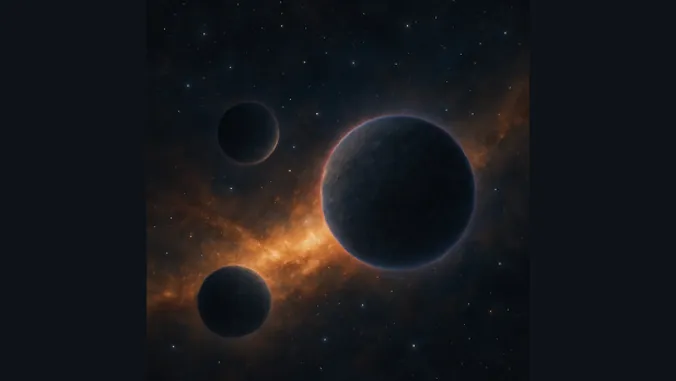
Unlocking the Universe: Could Mysterious ‘Dark Dwarfs’ Reveal Dark Matter Secrets?
2025-07-23
Author: Daniel
A Stunning Discovery at the Galactic Center
In a groundbreaking revelation that could reshape our understanding of the cosmos, a group of international scientists led by a researcher from the University of Hawai'i at Mānoa has proposed a captivating new type of astronomical entity known as a "dark dwarf." This enigmatic object might hold the key to unraveling one of the universe’s most elusive mysteries: dark matter.
What is Dark Matter?
Dark matter, an invisible and mysterious substance, constitutes approximately a quarter of the universe’s total matter. Unlike normal matter, it neither emits nor reflects light and can only be detected through its gravitational effects. Despite years of intensive research, the true nature of dark matter remains one of the greatest enigmas in modern astrophysics.
From Brown Dwarfs to Dark Dwarfs
The latest study suggests that dark dwarfs could emerge from brown dwarfs—small, faint objects that fall short of becoming stars due to their insufficient mass to sustain nuclear fusion. In areas dense with dark matter, such as the core of our Milky Way galaxy, these brown dwarfs may capture dark matter particles. Within these dark dwarfs, the particles could collide and annihilate each other, generating energy that allows the object to glow for extended periods—entirely distinct from the nuclear fusion that lights up conventional stars like our Sun.
A Unique Signature
According to researchers, one telltale sign of a dark dwarf's existence could be the presence of lithium. Typically, lithium is burned away in regular stars, but it might persist within these dark dwarfs, providing a means to differentiate them from their brown dwarf counterparts. Advanced telescopes, including the revolutionary James Webb Space Telescope, could detect these unique signatures and confirm the existence of dark dwarfs lurking at the heart of our galaxy.
A Step Closer to Understanding the Universe
As Jeremy Sakstein, the lead researcher and an assistant professor in UH Mānoa’s Department of Physics and Astronomy, asserts, "Finding dark dwarfs would be an important step toward understanding the true nature of dark matter and the fundamental makeup of the universe." This groundbreaking study, published in July 2025 in the Journal of Cosmology and Astroparticle Physics, positions Hawai'i as a pivotal hub for astronomical exploration, continuing its rich tradition of uncovering the mysteries of the universe.

 Brasil (PT)
Brasil (PT)
 Canada (EN)
Canada (EN)
 Chile (ES)
Chile (ES)
 Česko (CS)
Česko (CS)
 대한민국 (KO)
대한민국 (KO)
 España (ES)
España (ES)
 France (FR)
France (FR)
 Hong Kong (EN)
Hong Kong (EN)
 Italia (IT)
Italia (IT)
 日本 (JA)
日本 (JA)
 Magyarország (HU)
Magyarország (HU)
 Norge (NO)
Norge (NO)
 Polska (PL)
Polska (PL)
 Schweiz (DE)
Schweiz (DE)
 Singapore (EN)
Singapore (EN)
 Sverige (SV)
Sverige (SV)
 Suomi (FI)
Suomi (FI)
 Türkiye (TR)
Türkiye (TR)
 الإمارات العربية المتحدة (AR)
الإمارات العربية المتحدة (AR)